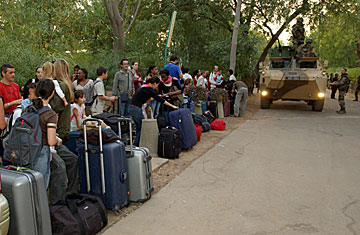
French nationals and other foreigners wait to be evacuated by the French army from N'Djamena, Chad.
The clatter of automatic rifle fire and occasional blasts of heavier weapons sounded throughout Chad's capital, N'Djamena, on Saturday afternoon, as rebel forces escalated their drive to oust president Idriss Déby. Up to 1,500 rebel soldiers entered N'Djamena on Friday evening, and the initial resistance they encountered began to wane on Saturday as defections seriously weakened the defending government forces. French radio reported European nationals holed up in a safe enclave as warning that the capital would fall to the rebels within hours.
The storming of N'Djamena marked the climax in a rapid and effective offensive by the rebels, who crossed into Chad from Sudan in a column of about 300 vehicles Thursday, and began their 200-mile push toward the capital. Eyewitness accounts from French nationals interviewed by French radio supported rebel claims that they were mopping up the last pockets of resistance by government forces in the city, despite government sources insisting they remain in control. Mahamat Ali Abdallah Nassour — a Chadian general who also carries several ministerial titles — insisted to Radio France International that "the Chadian defense and security forces control the capital," and had forced the rebels into retreat. "We are now securing the city," shot back rebel spokesman Abderamane Koullamalah, as other reports said President Déby had hunkered down in the presidential palace surrounded by loyalist troops.
In France, the former colonial power in Chad, Elysée officials told TIME that President Nicolas Sarkozy had spoken on the phone to Déby on Saturday to reiterate his support. Those officials wouldn't say whether any plans were afoot to evacuate Déby to Paris, however. And while France dispatched an additional 150 soldiers from Gabon to join the permanent 1,450 French troops posted in Chad, their mission seemed to be to help airlift foreign citizens to safety rather than to save the government.
Indeed, in stark contrast with decades of French intervention to save beleaguered friendly governments in its former African colonies, Elysée spokesman David Martinon stressed that the focus of the French government was "assuring that all the arrangements had been made to assure the safety of our nationals". Paris dispatched a French Army Airbus to N'Djamena Saturday to begin an airlift back to France when the situation allows it, but showed none of the readiness to put down a rebellion that had had been par for the course when Paris still considered Francophone Africa as France's back yard.
But even if France refrains from propping up its longtime ally, the rebels are unlikely to find much international support if they do take power. Rebel action has forced a delay in the deployment of 3,700 French-led European Union troops in Chad to set up humanitarian corridors for refugees from neighboring Darfur. Many member states of both the African Union (AU) and European Union (EU), in fact, accuse Sudan of having financed, trained, and armed the Chadian rebels as a proxy army to take down the Déby government. French Defense Minister Hervé Morin put both of those elements together when he described the timing of the offensive as "directly linked" with the pending EU peacekeeping deployment, whose presence in Chad — although neutral — "was going to interfere with rebel plans".
Suspicion and hostility towards Chad's rebels was echoed by the African Union, whose new president, Tanzanian Jakaya Kikwete, pledged that "in case of a rebel victory, we'll excommunicate them from the African Union". Even the region's former bad boy sponsor of rebellions, Libyan leader Mohammar Ghaddafi, condemned the rebel offensive as "a flagrant violation" of African security accords. United Nations Secretary General Ban Ki-moon noted that with violence and instability rife in throughout the area, "these developments are extremely dangerous, and could provoke an escalation throughout the region".
